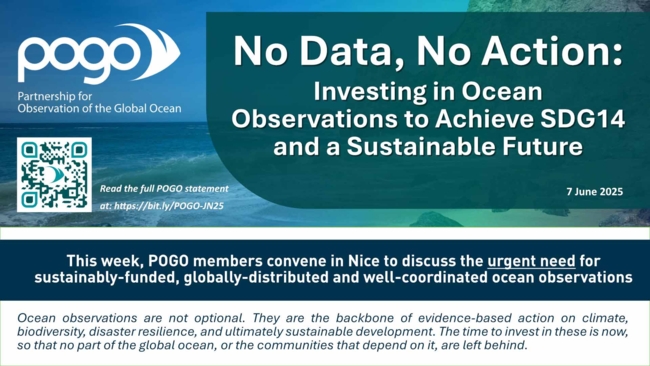ZMT unterstützt POGO-Erklärung "No Data, No Action: Investing in Ocean Observations to Achieve SDG14 and a Sustainable Future"
This text is currently only available in English:
A Statement from POGO:
On 7 June 2025, members of POGO, a global consortium of nearly 60 oceanographic research institutions, will convene in Nice, to discuss the urgent need for sustainably-funded, globally-distributed and well-coordinated ocean observations.
Building the global ocean observing system began more than two decades ago and important advances have been made, particularly in the realm of physical (climate-related) ocean observations. Disappointingly, biological and chemical observations are still lagging behind their physical counterparts: The observing system falls far short of what is needed.
Such observations are critical to achieving SDG14 and to measuring progress against the ambitions set out by the UNFCCC/ Paris Agreement, CBD/ Kunming-Montreal Global Biodiversity Framework, the new BBNJ Agreement, and other conventions and protocols being developed and implemented for the protection of our ocean.
Without sustained ocean monitoring we cannot predict the pace or scale of future warming and assess the efficacy of emissions reductions or evaluate the feasibility of carbon removal methods. These data will be critical in designing effective and achievable Nationally Determined Contributions (NDCs) as well as informing National Adaptation Plans (NAPs) that protect and support communities, marine life, and infrastructure from the growing risk of climate change.
To meet the biodiversity goals outlined in the KMGBF and the 2030 Targets, we must place ocean observations – particularly sustained, globally-coordinated biological observations – at the forefront of our efforts. The Subsidiary Body on Scientific, Technical, and Technological Advice (SBSTTA) recommendations stress that an improved understanding of ecosystem functioning, achieved through sustained ocean observations, is fundamental to conserving marine and coastal biodiversity.
The UN Ocean Conference (UNOC) Declaration rightly draws attention to the full range of ocean pressures (climate change, biodiversity loss, marine pollution, eutrophication, deoxygenation, ocean acidification) and the legal instruments that are being deployed to address these. But highlighting problems and crafting legal solutions is only the beginning. The success of these instruments hinges on our ability to track the state of the ocean and detect changes over time. Alarmingly, there is still very limited data and understanding, particularly for marine biodiversity, pollution and its impacts on ecosystems, and the effects of multiple stressors. In some parts of the world, even data on essential physical parameters are seriously lacking.
The UNOC Declaration also calls for sustainable management of coastal and ocean resources, including fisheries and deep-sea ecosystems. It focuses on coastal hazards, such as sea-level rise and disaster-risk reduction. These priorities all depend on sustained ocean observations that can guide science-based policies, track human impacts on marine life (including fish stocks), and inform early-warning systems to protect lives and livelihoods.
Meeting these urgent needs demands financial commitments to implement, coordinate, and develop capacity for ocean observations, data management, and streamlining of data products for informed decision-making. Observations require strong international partnerships that invest in sustaining existing systems and adding new systems where they do not currently exist, and for biological variables that are not yet been measured.
Ocean observations are not optional. They are the backbone of evidence-based action on climate, biodiversity, disaster resilience, and ultimately sustainable development. The time to invest in these is now, so that no part of the global ocean, or the communities that depend on it, are left behind.
This statement was prepared by the POGO Advocacy WG and issued by the Board of Trustees, on behalf of POGO.
Find out more on the signatories and supporters: https://pogo-ocean.org/no-data-no-action-statement/#signatories





